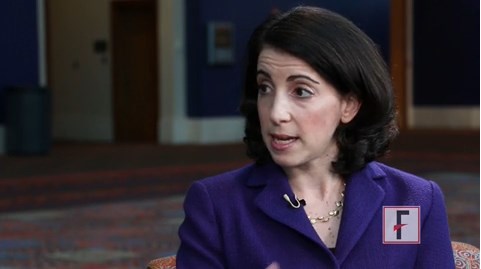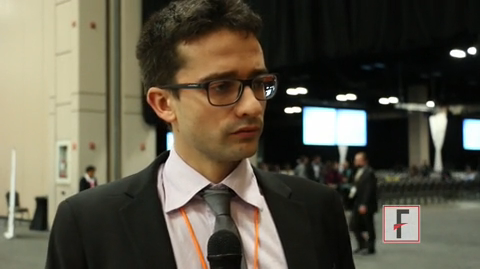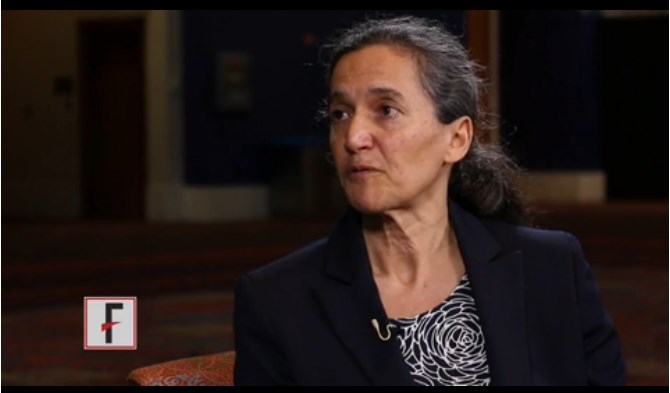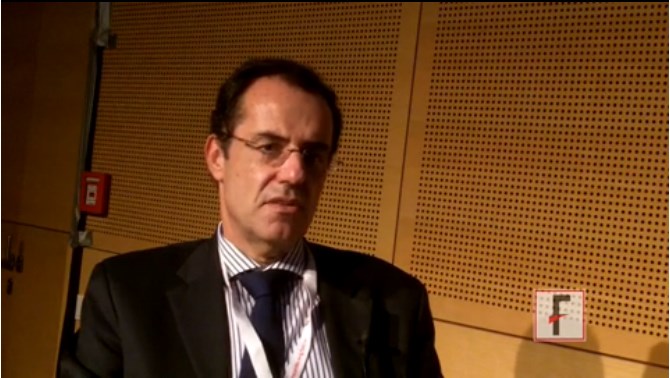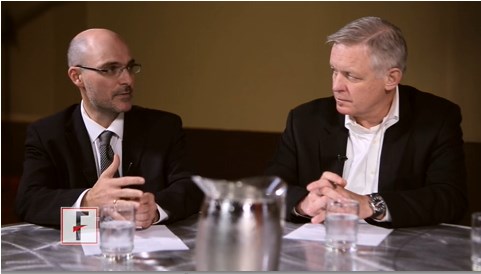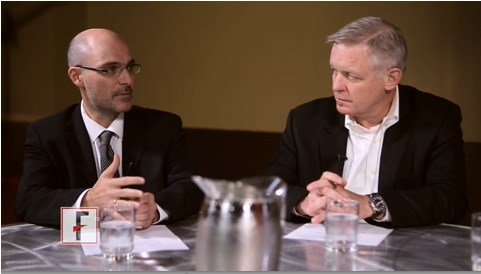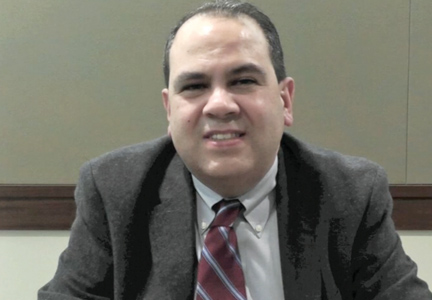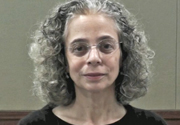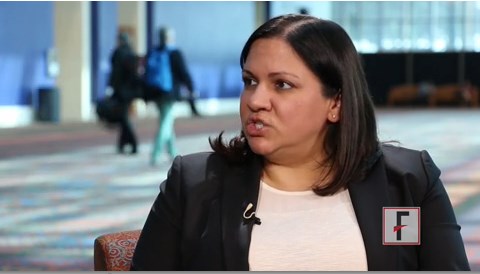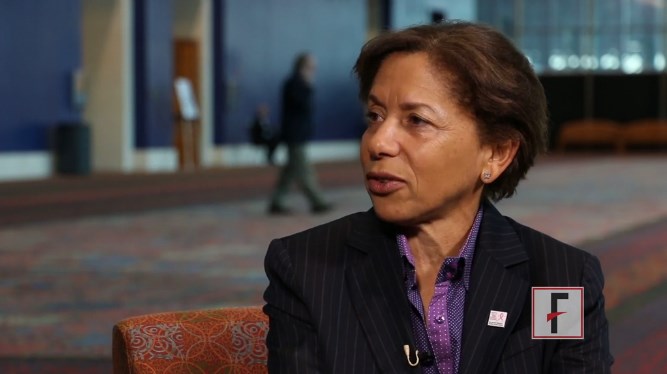User login
VIDEO: What have we learned about prevention of breast cancer from IBIS-1?
SAN ANTONIO – An analysis from 2 decades of follow-up in women who took tamoxifen or placebo for breast cancer prevention showed the benefit in prevention persists, but no benefit in survival has yet to emerge.
Dr. Erica Mayer of the Dana-Farber Cancer Institute, Boston, discusses IBIS-1 results in an interview and details what those results will mean in the clinic, at the San Antonio Breast Cancer Symposium.
The video associated with this article is no longer available on this site. Please view all of our videos on the MDedge YouTube channel
On Twitter @alz_gal
SAN ANTONIO – An analysis from 2 decades of follow-up in women who took tamoxifen or placebo for breast cancer prevention showed the benefit in prevention persists, but no benefit in survival has yet to emerge.
Dr. Erica Mayer of the Dana-Farber Cancer Institute, Boston, discusses IBIS-1 results in an interview and details what those results will mean in the clinic, at the San Antonio Breast Cancer Symposium.
The video associated with this article is no longer available on this site. Please view all of our videos on the MDedge YouTube channel
On Twitter @alz_gal
SAN ANTONIO – An analysis from 2 decades of follow-up in women who took tamoxifen or placebo for breast cancer prevention showed the benefit in prevention persists, but no benefit in survival has yet to emerge.
Dr. Erica Mayer of the Dana-Farber Cancer Institute, Boston, discusses IBIS-1 results in an interview and details what those results will mean in the clinic, at the San Antonio Breast Cancer Symposium.
The video associated with this article is no longer available on this site. Please view all of our videos on the MDedge YouTube channel
On Twitter @alz_gal
AT SABCS 2014
VIDEO: What was the most interesting thing you learned at the meeting?
SAN ANTONIO – Our reporter Michele Sullivan asked selected attendees at the San Antonio Breast Cancer Symposium to identify the most interesting or practice-changing study presented at the meeting. The answer was the same across the board - the Suppression of Ovarian Function Trial (SOFT), which showed that selective ovarian suppression reduces disease recurrence in women with early breast cancer.
In our video interview clinicians respond to the implications of the data in their practice.
The video associated with this article is no longer available on this site. Please view all of our videos on the MDedge YouTube channel
SAN ANTONIO – Our reporter Michele Sullivan asked selected attendees at the San Antonio Breast Cancer Symposium to identify the most interesting or practice-changing study presented at the meeting. The answer was the same across the board - the Suppression of Ovarian Function Trial (SOFT), which showed that selective ovarian suppression reduces disease recurrence in women with early breast cancer.
In our video interview clinicians respond to the implications of the data in their practice.
The video associated with this article is no longer available on this site. Please view all of our videos on the MDedge YouTube channel
SAN ANTONIO – Our reporter Michele Sullivan asked selected attendees at the San Antonio Breast Cancer Symposium to identify the most interesting or practice-changing study presented at the meeting. The answer was the same across the board - the Suppression of Ovarian Function Trial (SOFT), which showed that selective ovarian suppression reduces disease recurrence in women with early breast cancer.
In our video interview clinicians respond to the implications of the data in their practice.
The video associated with this article is no longer available on this site. Please view all of our videos on the MDedge YouTube channel
AT SABCS 2014
VIDEO: Dr. Prudence Francis describes how SOFT results will change practice
SAN ANTONIO – Adding ovarian suppression to 5 years of either tamoxifen or exemestane following chemotherapy, in women with hormone receptor-positive early breast cancer, provided a markedly greater reduction in breast cancer recurrence compared with standard therapy with tamoxifen alone, Dr. Prudence Francis reported at the San Antonio Breast Cancer Symposium.
However, not all premenopausal patients obtained benefit from ovarian suppression. Those who didn’t receive chemotherapy had excellent outcomes with 5 years of tamoxifen alone, with a 95.8% disease-free survival at 5 years. Dr. Francis, who is head of breast medical oncology at the Peter MacCallum Cancer Center, Melbourne, discusses in an interview how these key findings of SOFT (the Suppression of Ovarian Function Trial) should change practice in the clinic next week.
The video associated with this article is no longer available on this site. Please view all of our videos on the MDedge YouTube channel
SAN ANTONIO – Adding ovarian suppression to 5 years of either tamoxifen or exemestane following chemotherapy, in women with hormone receptor-positive early breast cancer, provided a markedly greater reduction in breast cancer recurrence compared with standard therapy with tamoxifen alone, Dr. Prudence Francis reported at the San Antonio Breast Cancer Symposium.
However, not all premenopausal patients obtained benefit from ovarian suppression. Those who didn’t receive chemotherapy had excellent outcomes with 5 years of tamoxifen alone, with a 95.8% disease-free survival at 5 years. Dr. Francis, who is head of breast medical oncology at the Peter MacCallum Cancer Center, Melbourne, discusses in an interview how these key findings of SOFT (the Suppression of Ovarian Function Trial) should change practice in the clinic next week.
The video associated with this article is no longer available on this site. Please view all of our videos on the MDedge YouTube channel
SAN ANTONIO – Adding ovarian suppression to 5 years of either tamoxifen or exemestane following chemotherapy, in women with hormone receptor-positive early breast cancer, provided a markedly greater reduction in breast cancer recurrence compared with standard therapy with tamoxifen alone, Dr. Prudence Francis reported at the San Antonio Breast Cancer Symposium.
However, not all premenopausal patients obtained benefit from ovarian suppression. Those who didn’t receive chemotherapy had excellent outcomes with 5 years of tamoxifen alone, with a 95.8% disease-free survival at 5 years. Dr. Francis, who is head of breast medical oncology at the Peter MacCallum Cancer Center, Melbourne, discusses in an interview how these key findings of SOFT (the Suppression of Ovarian Function Trial) should change practice in the clinic next week.
The video associated with this article is no longer available on this site. Please view all of our videos on the MDedge YouTube channel
AT SABCS 2014
VIDEO: Focused cardiac ultrasound aids acute heart failure patients
VIENNA – Bedside echocardiography has become a key part of quickly assessing patients with acute heart failure to decide the best management strategy.
But bedside echo images often are challenging to interpret, so physicians performing an initial work-up of an acute heart failure patient need training in a basic echocardiography examination, Dr. Nuno Cardim said in an interview during the annual meeting of the European Association of Cardiovascular Imaging.
Known as Focused Cardiac Ultrasound (FoCUS), this triage-level exam is distinct from a comprehensive echocardiography assessment. Instead, FoCUS addresses some basic, yes-or-no, present-or-absent questions regarding systolic function, hypovolemia, tamponade, pleural effusion, and pulmonary embolus.
In a position paper and then in practice recommendations issued in 2014, the European Association of Cardiovascular Imaging acknowledged that use of FoCUS in acute heart failure patients was “irreversible,” said Dr. Cardim, professor and director of echocardiography and cardiac imaging at Hospital da Luz in Lisbon.
Cardiologists and echocardiography specialists need to make sure that FoCUS training is available to all physicians who might see suspected acute heart failure patients in emergency medicine settings, Dr. Cardim said.
Dr. Cardim had no disclosures.
The video associated with this article is no longer available on this site. Please view all of our videos on the MDedge YouTube channel
On Twitter @mitchelzoler
VIENNA – Bedside echocardiography has become a key part of quickly assessing patients with acute heart failure to decide the best management strategy.
But bedside echo images often are challenging to interpret, so physicians performing an initial work-up of an acute heart failure patient need training in a basic echocardiography examination, Dr. Nuno Cardim said in an interview during the annual meeting of the European Association of Cardiovascular Imaging.
Known as Focused Cardiac Ultrasound (FoCUS), this triage-level exam is distinct from a comprehensive echocardiography assessment. Instead, FoCUS addresses some basic, yes-or-no, present-or-absent questions regarding systolic function, hypovolemia, tamponade, pleural effusion, and pulmonary embolus.
In a position paper and then in practice recommendations issued in 2014, the European Association of Cardiovascular Imaging acknowledged that use of FoCUS in acute heart failure patients was “irreversible,” said Dr. Cardim, professor and director of echocardiography and cardiac imaging at Hospital da Luz in Lisbon.
Cardiologists and echocardiography specialists need to make sure that FoCUS training is available to all physicians who might see suspected acute heart failure patients in emergency medicine settings, Dr. Cardim said.
Dr. Cardim had no disclosures.
The video associated with this article is no longer available on this site. Please view all of our videos on the MDedge YouTube channel
On Twitter @mitchelzoler
VIENNA – Bedside echocardiography has become a key part of quickly assessing patients with acute heart failure to decide the best management strategy.
But bedside echo images often are challenging to interpret, so physicians performing an initial work-up of an acute heart failure patient need training in a basic echocardiography examination, Dr. Nuno Cardim said in an interview during the annual meeting of the European Association of Cardiovascular Imaging.
Known as Focused Cardiac Ultrasound (FoCUS), this triage-level exam is distinct from a comprehensive echocardiography assessment. Instead, FoCUS addresses some basic, yes-or-no, present-or-absent questions regarding systolic function, hypovolemia, tamponade, pleural effusion, and pulmonary embolus.
In a position paper and then in practice recommendations issued in 2014, the European Association of Cardiovascular Imaging acknowledged that use of FoCUS in acute heart failure patients was “irreversible,” said Dr. Cardim, professor and director of echocardiography and cardiac imaging at Hospital da Luz in Lisbon.
Cardiologists and echocardiography specialists need to make sure that FoCUS training is available to all physicians who might see suspected acute heart failure patients in emergency medicine settings, Dr. Cardim said.
Dr. Cardim had no disclosures.
The video associated with this article is no longer available on this site. Please view all of our videos on the MDedge YouTube channel
On Twitter @mitchelzoler
AT EUROECHO-IMAGING 2014
VIDEO: Multidisciplinary panel addresses role of anesthesia, analgesics in patient outcomes
SAN ANTONIO – A panel that included a breast surgeon, a medical oncologist, and a patient advocate met at the San Antonio Breast Cancer Symposium to discuss emerging research on the link between anesthesia and cancer recurrence. The issue was first raised following publication of a retrospective study in 2006, which showed a 40% reduction in recurrence in women given a type of regional anesthesia, with general anesthesia, rather than general anesthesia and postoperative morphine anesthesia during primary breast cancer surgery.
Dr. William J. Gradishar, Betsy Bramsen Professor of Breast Oncology at Northwestern University, Chicago, moderated the discussion with Dr. Juan Cata, assistant professor in the department of anesthesiology and perioperative medicine at the University of Texas MD Anderson Cancer Center, Dr. Susan Love, breast surgeon, and president and medical director of the Dr. Susan Love Research Foundation, and Musa Mayer, author and patient advocate.
The panel addressed the impact of surgery alone, anesthesia during surgery, and perioperative analgesics on patients’ immune functioning and ultimately disease outcomes. The state of the evidence in breast cancer and other tumor types, and an ongoing prospective trial with breast cancer patients, were also discussed.
The video associated with this article is no longer available on this site. Please view all of our videos on the MDedge YouTube channel
lnikolaides@frontlinemedcom.com
On Twitter @nikolaideslaura
SAN ANTONIO – A panel that included a breast surgeon, a medical oncologist, and a patient advocate met at the San Antonio Breast Cancer Symposium to discuss emerging research on the link between anesthesia and cancer recurrence. The issue was first raised following publication of a retrospective study in 2006, which showed a 40% reduction in recurrence in women given a type of regional anesthesia, with general anesthesia, rather than general anesthesia and postoperative morphine anesthesia during primary breast cancer surgery.
Dr. William J. Gradishar, Betsy Bramsen Professor of Breast Oncology at Northwestern University, Chicago, moderated the discussion with Dr. Juan Cata, assistant professor in the department of anesthesiology and perioperative medicine at the University of Texas MD Anderson Cancer Center, Dr. Susan Love, breast surgeon, and president and medical director of the Dr. Susan Love Research Foundation, and Musa Mayer, author and patient advocate.
The panel addressed the impact of surgery alone, anesthesia during surgery, and perioperative analgesics on patients’ immune functioning and ultimately disease outcomes. The state of the evidence in breast cancer and other tumor types, and an ongoing prospective trial with breast cancer patients, were also discussed.
The video associated with this article is no longer available on this site. Please view all of our videos on the MDedge YouTube channel
lnikolaides@frontlinemedcom.com
On Twitter @nikolaideslaura
SAN ANTONIO – A panel that included a breast surgeon, a medical oncologist, and a patient advocate met at the San Antonio Breast Cancer Symposium to discuss emerging research on the link between anesthesia and cancer recurrence. The issue was first raised following publication of a retrospective study in 2006, which showed a 40% reduction in recurrence in women given a type of regional anesthesia, with general anesthesia, rather than general anesthesia and postoperative morphine anesthesia during primary breast cancer surgery.
Dr. William J. Gradishar, Betsy Bramsen Professor of Breast Oncology at Northwestern University, Chicago, moderated the discussion with Dr. Juan Cata, assistant professor in the department of anesthesiology and perioperative medicine at the University of Texas MD Anderson Cancer Center, Dr. Susan Love, breast surgeon, and president and medical director of the Dr. Susan Love Research Foundation, and Musa Mayer, author and patient advocate.
The panel addressed the impact of surgery alone, anesthesia during surgery, and perioperative analgesics on patients’ immune functioning and ultimately disease outcomes. The state of the evidence in breast cancer and other tumor types, and an ongoing prospective trial with breast cancer patients, were also discussed.
The video associated with this article is no longer available on this site. Please view all of our videos on the MDedge YouTube channel
lnikolaides@frontlinemedcom.com
On Twitter @nikolaideslaura
AT SABCS 2014
VIDEO: Multidisciplinary panel addresses role of anesthesia, analgesics in patient outcomes
SAN ANTONIO – As follow-up to “Does choice of anesthesia set up your patient for metastasis?” published in the September issue, the Oncology Report brought together an anesthesiologist, a breast surgeon, a medical oncologist, and a patient advocate at the San Antonio Breast Cancer Symposium to further discuss the topic. The issue was first raised following publication of a retrospective study in 2006, which showed a 40% reduction in recurrence in women given a type of regional anesthesia, with general anesthesia, rather than general anesthesia and postoperative morphine anesthesia during primary breast cancer surgery.
Dr. William J. Gradishar, Betsy Bramsen Professor of Breast Oncology at Northwestern University, Chicago, moderated the discussion with Dr. Juan Cata, assistant professor in the department of anesthesiology and perioperative medicine at the University of Texas MD Anderson Cancer Center, Dr. Susan Love, breast surgeon, and president and medical director of the Dr. Susan Love Research Foundation, and Musa Mayer, author and patient advocate.
The panel addressed the impact of surgery alone, anesthesia during surgery, and perioperative analgesics on patients’ immune functioning and ultimately disease outcomes. The state of the evidence in breast cancer and other tumor types, and an ongoing prospective trial with breast cancer patients, were also discussed.
The video associated with this article is no longer available on this site. Please view all of our videos on the MDedge YouTube channel
lnikolaides@frontlinemedcom.com
On Twitter @nikolaideslaura
SAN ANTONIO – As follow-up to “Does choice of anesthesia set up your patient for metastasis?” published in the September issue, the Oncology Report brought together an anesthesiologist, a breast surgeon, a medical oncologist, and a patient advocate at the San Antonio Breast Cancer Symposium to further discuss the topic. The issue was first raised following publication of a retrospective study in 2006, which showed a 40% reduction in recurrence in women given a type of regional anesthesia, with general anesthesia, rather than general anesthesia and postoperative morphine anesthesia during primary breast cancer surgery.
Dr. William J. Gradishar, Betsy Bramsen Professor of Breast Oncology at Northwestern University, Chicago, moderated the discussion with Dr. Juan Cata, assistant professor in the department of anesthesiology and perioperative medicine at the University of Texas MD Anderson Cancer Center, Dr. Susan Love, breast surgeon, and president and medical director of the Dr. Susan Love Research Foundation, and Musa Mayer, author and patient advocate.
The panel addressed the impact of surgery alone, anesthesia during surgery, and perioperative analgesics on patients’ immune functioning and ultimately disease outcomes. The state of the evidence in breast cancer and other tumor types, and an ongoing prospective trial with breast cancer patients, were also discussed.
The video associated with this article is no longer available on this site. Please view all of our videos on the MDedge YouTube channel
lnikolaides@frontlinemedcom.com
On Twitter @nikolaideslaura
SAN ANTONIO – As follow-up to “Does choice of anesthesia set up your patient for metastasis?” published in the September issue, the Oncology Report brought together an anesthesiologist, a breast surgeon, a medical oncologist, and a patient advocate at the San Antonio Breast Cancer Symposium to further discuss the topic. The issue was first raised following publication of a retrospective study in 2006, which showed a 40% reduction in recurrence in women given a type of regional anesthesia, with general anesthesia, rather than general anesthesia and postoperative morphine anesthesia during primary breast cancer surgery.
Dr. William J. Gradishar, Betsy Bramsen Professor of Breast Oncology at Northwestern University, Chicago, moderated the discussion with Dr. Juan Cata, assistant professor in the department of anesthesiology and perioperative medicine at the University of Texas MD Anderson Cancer Center, Dr. Susan Love, breast surgeon, and president and medical director of the Dr. Susan Love Research Foundation, and Musa Mayer, author and patient advocate.
The panel addressed the impact of surgery alone, anesthesia during surgery, and perioperative analgesics on patients’ immune functioning and ultimately disease outcomes. The state of the evidence in breast cancer and other tumor types, and an ongoing prospective trial with breast cancer patients, were also discussed.
The video associated with this article is no longer available on this site. Please view all of our videos on the MDedge YouTube channel
lnikolaides@frontlinemedcom.com
On Twitter @nikolaideslaura
AT SABCS 2014
Joseph Sirven, MD
The video associated with this article is no longer available on this site. Please view all of our videos on the MDedge YouTube channel
The video associated with this article is no longer available on this site. Please view all of our videos on the MDedge YouTube channel
The video associated with this article is no longer available on this site. Please view all of our videos on the MDedge YouTube channel
Dale Hesdorffer, PhD
The video associated with this article is no longer available on this site. Please view all of our videos on the MDedge YouTube channel
The video associated with this article is no longer available on this site. Please view all of our videos on the MDedge YouTube channel
The video associated with this article is no longer available on this site. Please view all of our videos on the MDedge YouTube channel
VIDEO: First report of immune checkpoint inhibitor treatment for breast cancer
SAN ANTONIO– Roughly one in five women with heavily pretreated, advanced triple-negative breast cancer experienced a response to monotherapy using the novel immune checkpoint inhibitor pembrolizumab in KEYNOTE-012, a small proof-of-concept study.
In a video interview at the San Antonio Breast Cancer Symposium, Dr. Rita Nanda, who presented the results, describes the long duration of that response, more than 40 weeks in most of the women, all of whom had received multiple lines of chemotherapy. Dr. Nanda of the University of Chicago also commented on the possible study of pembrolizumab against other subtypes of breast cancer and on possible combination regimens.
The video associated with this article is no longer available on this site. Please view all of our videos on the MDedge YouTube channel
SAN ANTONIO– Roughly one in five women with heavily pretreated, advanced triple-negative breast cancer experienced a response to monotherapy using the novel immune checkpoint inhibitor pembrolizumab in KEYNOTE-012, a small proof-of-concept study.
In a video interview at the San Antonio Breast Cancer Symposium, Dr. Rita Nanda, who presented the results, describes the long duration of that response, more than 40 weeks in most of the women, all of whom had received multiple lines of chemotherapy. Dr. Nanda of the University of Chicago also commented on the possible study of pembrolizumab against other subtypes of breast cancer and on possible combination regimens.
The video associated with this article is no longer available on this site. Please view all of our videos on the MDedge YouTube channel
SAN ANTONIO– Roughly one in five women with heavily pretreated, advanced triple-negative breast cancer experienced a response to monotherapy using the novel immune checkpoint inhibitor pembrolizumab in KEYNOTE-012, a small proof-of-concept study.
In a video interview at the San Antonio Breast Cancer Symposium, Dr. Rita Nanda, who presented the results, describes the long duration of that response, more than 40 weeks in most of the women, all of whom had received multiple lines of chemotherapy. Dr. Nanda of the University of Chicago also commented on the possible study of pembrolizumab against other subtypes of breast cancer and on possible combination regimens.
The video associated with this article is no longer available on this site. Please view all of our videos on the MDedge YouTube channel
AT SABCS 2014
VIDEO: High TILs associated with less efficacy from trastuzumab
SAN ANTONIO – Know your patient’s number: Dr. Edith A. Perez of the Mayo Clinic in Jacksonville, Fla., explains in a video interview how the level of stromal tumor infiltrating lymphocytes (TILs) in women with early-stage, HER2+ breast cancer may be useful in identifying a subset who might potentially do quite well with chemotherapy alone.
The video associated with this article is no longer available on this site. Please view all of our videos on the MDedge YouTube channel
SAN ANTONIO – Know your patient’s number: Dr. Edith A. Perez of the Mayo Clinic in Jacksonville, Fla., explains in a video interview how the level of stromal tumor infiltrating lymphocytes (TILs) in women with early-stage, HER2+ breast cancer may be useful in identifying a subset who might potentially do quite well with chemotherapy alone.
The video associated with this article is no longer available on this site. Please view all of our videos on the MDedge YouTube channel
SAN ANTONIO – Know your patient’s number: Dr. Edith A. Perez of the Mayo Clinic in Jacksonville, Fla., explains in a video interview how the level of stromal tumor infiltrating lymphocytes (TILs) in women with early-stage, HER2+ breast cancer may be useful in identifying a subset who might potentially do quite well with chemotherapy alone.
The video associated with this article is no longer available on this site. Please view all of our videos on the MDedge YouTube channel
AT SABCS 2014
